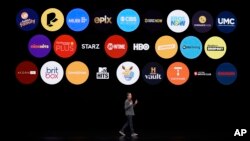Mounting public concern over data privacy is pushing tech giants to change their ways, industry experts said on Tuesday, a day after Apple unveiled a series of new products, stressing their privacy-friendly features.
The world's second-most valuable technology company will now offer a credit card, a news service called Apple News+ and a TV service with original programming, all designed to keep users' information private and secure, it said on Monday.
Apple's announcements come on the heels of user privacy scandals that have rocked tech companies over the last several years.
Such clarity is welcome in a digital environment that lacks transparency and where people are sometimes unaware of what happens to their data, said Hielke Hijmans, a law expert at the Brussels Privacy Hub, a Belgian research center.
"This empowers the users and helps to give them a genuine choice," he said.
Earlier this month, rivals like Google and Facebook said they were making changes to boost user privacy.
Facebook founder Mark Zuckerberg said the company plans to encrypt more of the conversations happening on its messaging services, which could limit Facebook's ability to parse those conversations.
Google said it is working on privacy enhancements for the Android operating system that powers most of the world's mobile phones, such as locking down access to phone cameras and microphones.
At the launch event in California, Apple executives said the company will not allow advertisers to track what users read on its news service and it will not itself have that data.
Consumer data from its credit card will not be shared or sold to third parties for marketing, and the company will not know where a purchase was made, what was bought or how much it cost, Apple said.
Yet, Apple's privacy moves aren't likely to be mimicked by everyone, said Jan Penfrat, a senior policy advisor at advocacy group European Digital Rights (EDRi).
Assembling profiles of consumers for the purpose of targeting advertisements is at the heart of how Google and Facebook made money, he said.
Unlike those companies, Apple's business model is not largely dependent on advertising.
"Apple is rather the exception, not the norm," Penfrat added.








